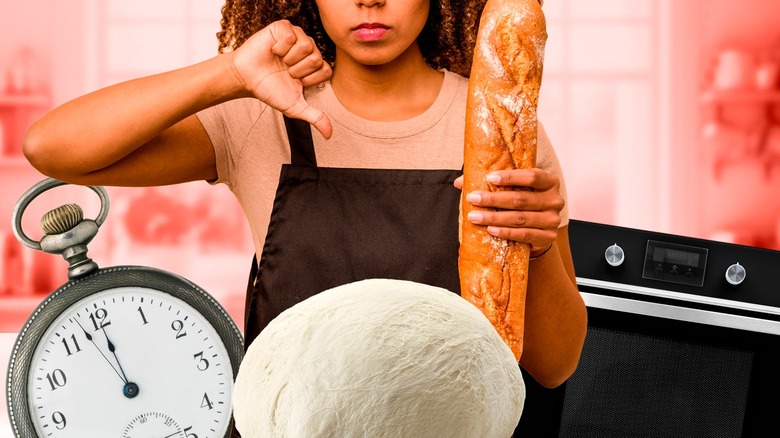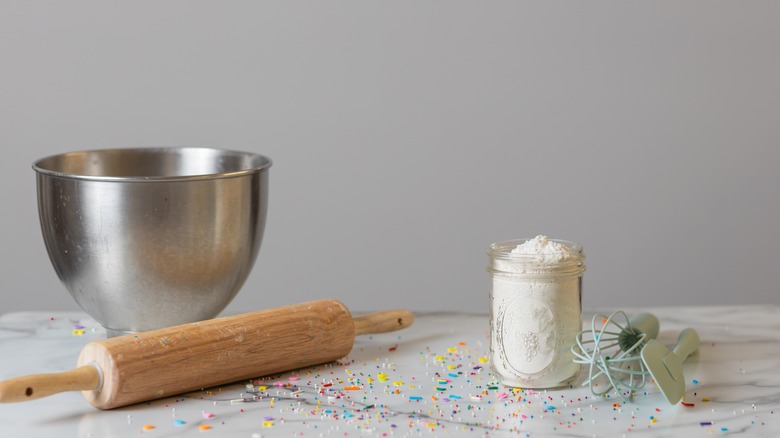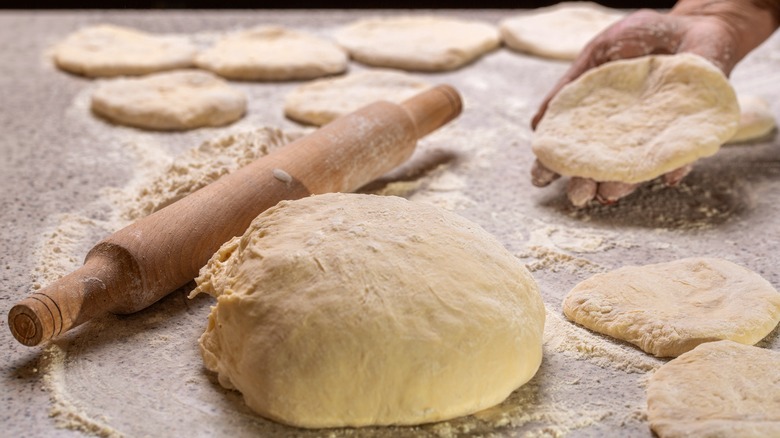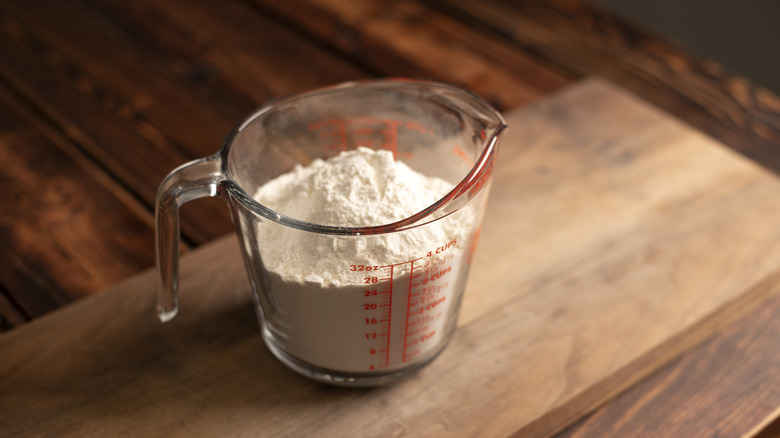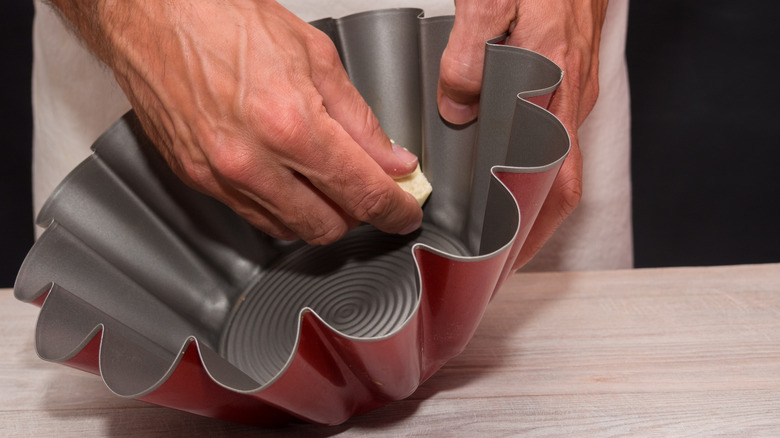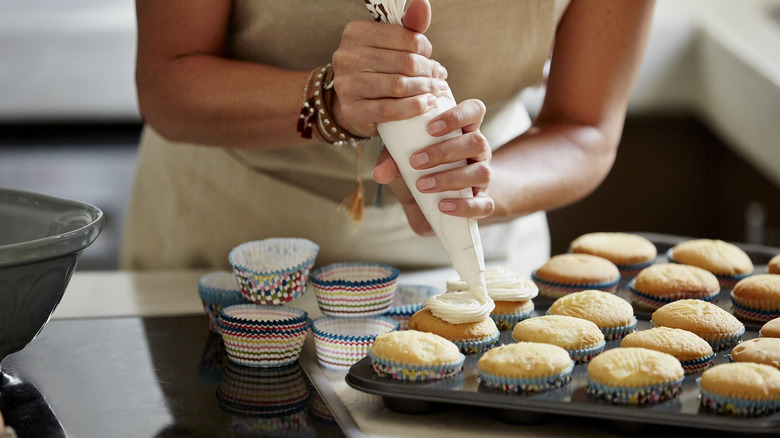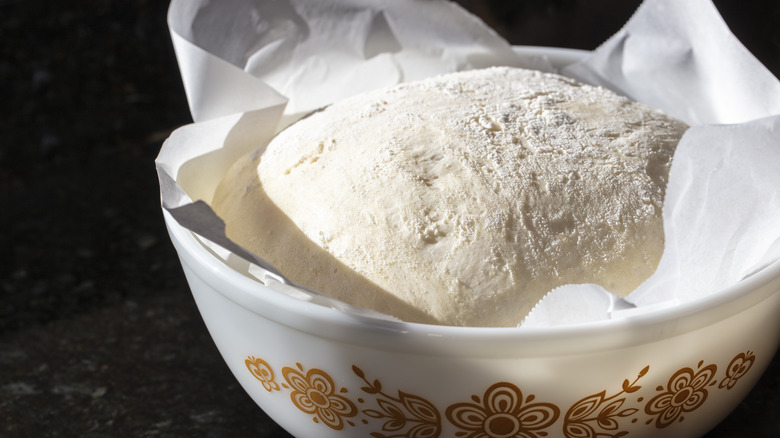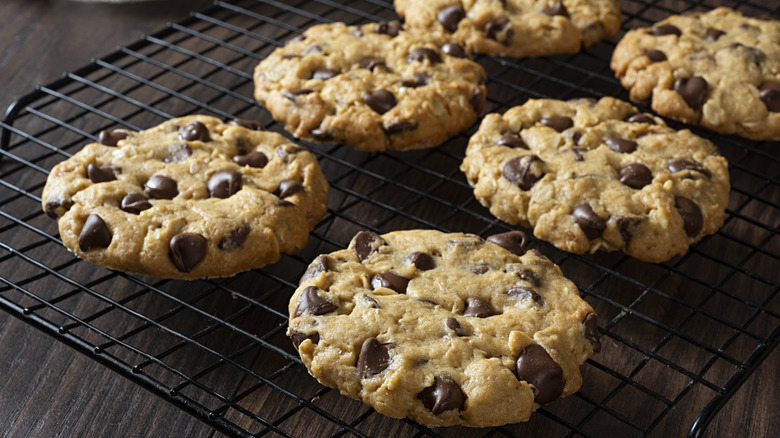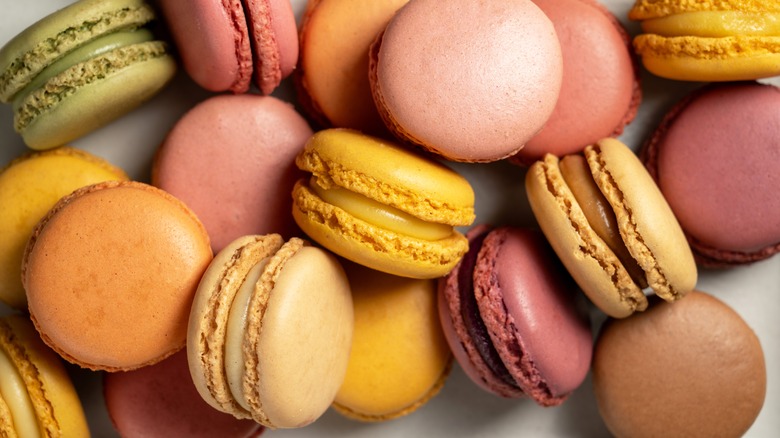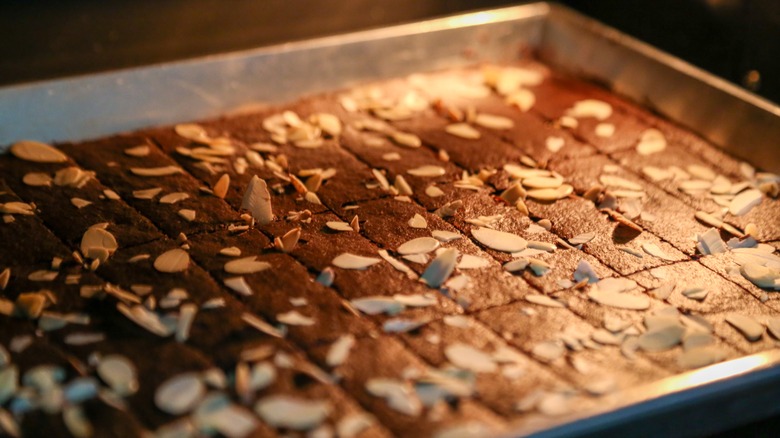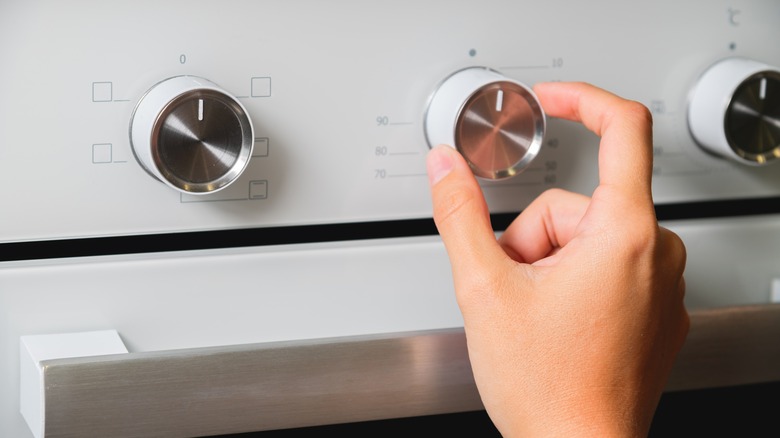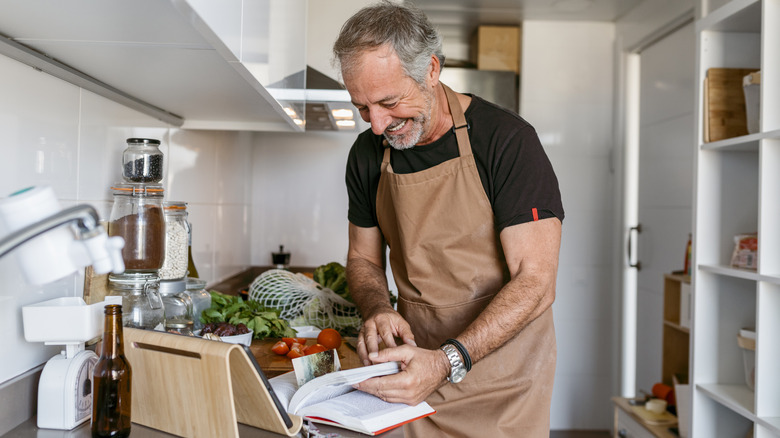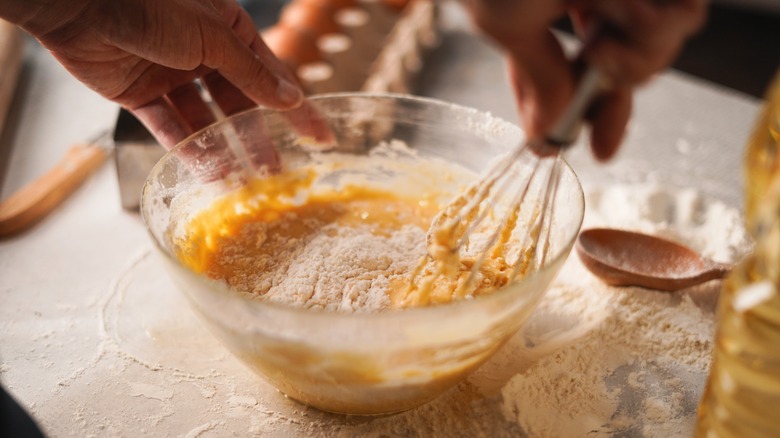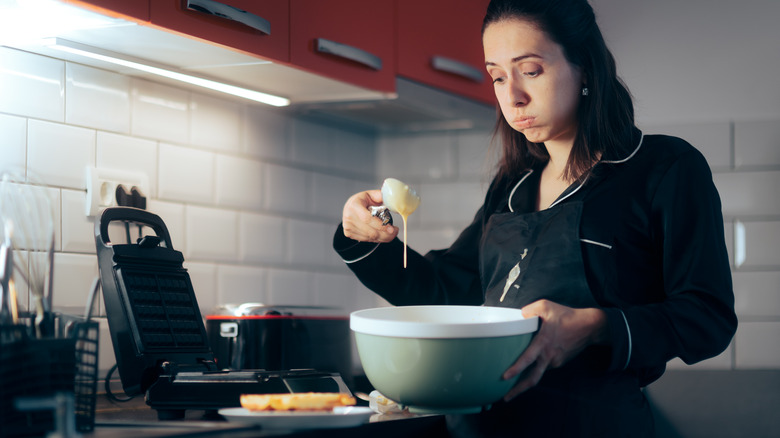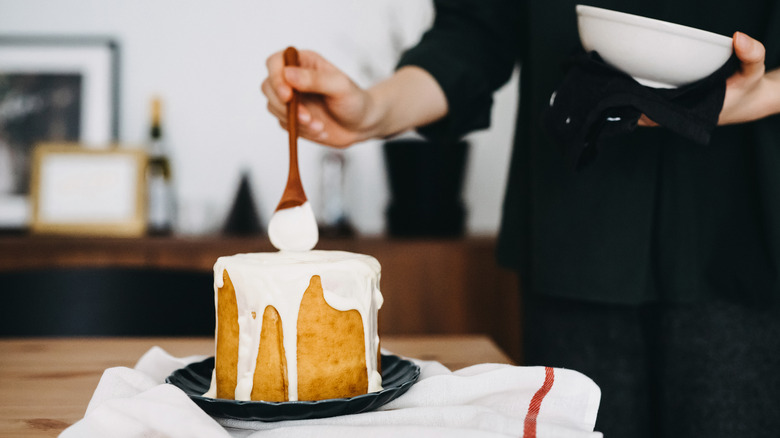Mistakes Only Beginner Bakers Make, According To Baking Experts
For most of us, few things are more comforting than cakes, cookies, and other baked treats. But despite their sweet reputation, it can be hard to make them correctly, as just about anyone who's tried their hand at baking has probably found out. Baked goods may look soft and cute, but as it turns out, they're pretty demanding. One little slip-up can take your dream pastry recipes from fabulous to failure. Luckily, there are some easy fixes to many common baking errors.
Four experienced bakers exclusively shared with Chowhound the most common mistakes they see beginner bakers make — and how to avoid them. Here are tips from Stephanie Rutherford, baker and author of baking blog Stephanie's Sweet Treats; head baker Gayle Clutterbuck and head decorator Marta Nilsson of London's The Hummingbird Bakery, famous for its American-style cakes, cupcakes, and desserts; and Gemma Stafford, professional chef, cookbook author, and star of the hit online baking show "Bigger Bolder Baking."
Not preparing before you bake
Some baked treats may seem easy to make, but in reality, few baking recipes are easy to improvise. That's why it's crucial to read a recipe from start to finish before you begin baking. "People are excited to get started so [they] just jump in," chef and baking show star Gemma Stafford said."Unfortunately, they realize later that their recipe has more stages than expected, maybe [including] resting time, freezing or even overnight proofing." Even the way some ingredients might need to be prepared or integrated into a recipe — for instance, refrigerated in advance — can make a difference.
And then there are the baking tools you might need. Do you have enough bowls? Do you have a mixer or whisk? When it comes to baking, advanced preparation is clearly a key ingredient. "Take the time in the beginning to gather all of your ingredients [and] equipment and make sure you understand each step," Stafford said.
The Hummingbird Bakery's Marta Nilsson even suggests preparing certain ingredients in advance, as well as taking shortcuts, if necessary. She encourages bakers to ask themselves: "Is it possible to make life easier by making/prepping some components ahead of time?" If the answer is yes, do it.
Underestimating how much time you need
Many of us bakers have been there: You find what seems like a quick, easy recipe and you happily get started ... only to realize that you're going to have to leave your cookie dough in the fridge for longer than you thought you'd spend on the entire recipe. When baking from scratch, it's probably a good rule of thumb to expect that few things are quick, since many kinds of dough will need to rest or be refrigerated.
If you've ever been caught off guard by this, you're not alone. Even experienced bakers have been taken by surprise. "I have been caught before where I'm making a bread that I think will take two hours until I continue to read and realize it's an overnight situation," Stafford said. Once again, the solution comes down to reading the recipe before you start. And as a general rule, if you plan to do some baking, make sure you have at least a few hours you can set aside.
Not measuring your flour correctly
Although it's a crucial ingredient in many baked treats, soft, nearly odorless flour has proven itself challenging to novice bakers. Expert bakers will tell you that not measuring your flour correctly is one of the biggest reasons for baking failures. In fact, if your cakes are "hard, or tough, or biscuit-like," the incorrect amount of flour is probably to blame according to blogger and baking expert Stephanie Rutherford who said that not measuring flour correctly was "the number one mistake I used to make when I was first learning [how to bake]."
Rutherford explained that this happens because a lot of people might use their measuring cup to scoop flour directly from the container, rather than taking the time to carefully pour it into the measuring cup. This move may not seem like a big deal, but it makes a difference in the final product. "[It] compacts the flour, and will result in cookies that don't spread, cakes that are dry, and brownies that are cakey," Rutherford said. She recommends using a spoon to first pour the flour into the measuring cup, being sure to level it off.
Forgetting to grease or flour your pan
There are few things more heartbreaking in the kitchen than having your beautifully baked cake stick to the pan. Most cake or brownie recipes will probably say you should grease your mold or pan with butter or cooking spray, sprinkle it with flour, or both, to prevent this from happening. But it's an easy step to forget, especially when you're so focused on getting everything else right. Still, not greasing or flouring your pan can be the precursor to a baking disaster, leaving you with a cake that's in pieces or significant sections of brownies that have to be left behind in the pan.
While there are some cases where you shouldn't grease or flour your pan at all — the texture of certain baked goods, like cookies or pies, could be negatively affected by that coating of butter or flour — many bakers advise even greasing or flouring cake pans of the non-stick variety, because you can never be too careful.
Not realizing the impact of altitude
Stephanie Rutherford tells us that when it comes to baking, "a lot of people don't realize that small things can greatly impact a recipe." One of those is where you live. Altitude can affect baking in several ways. For instance, lower air pressure means it will take longer for things to bake, and you may even have to raise your oven temperature. Altitude also impacts evaporation, which means that the amount of some ingredients will need to be updated accordingly. "You need to add a tablespoon of flour per cup of flour," Rutherford said of baking cookies in high altitude.
Not factoring in altitude can lead to a wide range of baking disasters, including fallen cakes, dry or crumbly cakes, and cakes that won't set. Cookies could spread too much or not enough, or be too dry, among other potential issues. If you live at a high altitude, it's a good idea to look up baking advice before you begin.
Baking cupcakes at too a high temperature
It's happened to the best of us: those cupcakes you baked for a birthday or a special dessert were supposed to be smooth and flat on top, perfect for icing. But when you take them out of the oven, they're cracked, uneven, or craggy on top, more like topographical maps than the ideal surface for decorating. The problem, it turns out, probably lies in how high you set your oven.
"We often see people setting the oven too high so the cake rises too fast, [which] then gives a pointy/domed top of the cupcake with a crack," The Hummingbird Bakery's Gayle Clutterbuck said. "If you want to cover the cake or write on it, this makes it hard." The solution? Turn the oven down a few degrees and increase your bake time for a flatter cupcake top.
Not letting your dough rest
In many baking recipes, you'll find instructions to let the dough that you've made "rest." This means setting it aside, either on your counter or in the fridge, depending on what the recipe calls for. Letting dough rest allows the flour to absorb water and develop gluten, which will make it more flexible and easier to work with. Resting also makes the dough more flavorful. So there are definitely good reasons for pausing your recipe.
Following a recipe's specific instructions for resting dough is important. For instance, when it comes to cookies, Rutherford often calls for letting the dough rest "for 10 minutes before you begin to scoop it, especially in recipes with melted butter." She explains that this will keep the cookies from spreading too much, a frustrating issue many of us bakers have experienced.
Underestimating the importance of cooling time
Countless baking recipes instruct bakers to let their pastries cool down, sometimes before they move on to the next step. In typical recipes, cooling time is often arbitrary or based on preferences. But when baking, letting things cool down is a crucial part of the process. For one thing, if you're planning on icing a cake or cupcakes, doing it while they are hot will be a messy process that ultimately won't allow your icing to stick properly.
There are more subtle reasons to respect cooling times, too. For instance, if you've ever baked what looked like perfect cookies, only to have them come apart when you set them on a serving plate, it very well might have been because you didn't let them cool down for a few minutes on the baking tray, and then on a cooling rack. If you don't have a cooling rack, you'll find lots of ideas for cooling rack substitutes online. Personally, placing the cookies on paper towels laid out on the counter always works for me.
Starting out with a challenging recipe
When you start baking, a world of tasty possibilities opens to you. But one common mistake Stafford sees beginner bakers make is taking on a challenging recipe before they've tried anything else. "We are all guilty of seeing a lovely baked good like an elaborate cake or a beautifully laminated breakfast pastry and thinking 'I will try to make that!'," she said. But the result is more likely to be dire than delicious. And if you don't get it right, it might discourage you from ever trying anything else. "It's important while you are learning the ropes to pick a recipe that fits [your] skill set," Stafford said. "This way you are setting yourself up for success, which will mean you will have the confidence to keeping on baking and move on to more involved recipes with different techniques."
For those new to baking, Stafford suggests giving mug cakes a try — her one-minute recipes went viral on YouTube in 2014. They only require a few tablespoons of basic ingredients and are made in a microwave, rather than an oven, so cleanup is easy. The Hummingbird Bakery's Marta Nilsson agrees that knowing your skill level is important. She advises beginner bakers to build their confidence by starting with recipes that are simple, such as cookies or muffins.
Over-baking
One of the trickiest things about baking is that even if you follow the recipe, you could risk over-baking your tasty treat. Many beginner bakers don't realize that baked goods continue to cook as long as they're in a hot or warm oven, even if that oven has been turned off.
Fortunately, there are lots of strategies to avoid over-baking. Stephanie Rutherford has a few tips. "When I bake a recipe for the first time, I always do the shortest amount of time listed on the recipe," she said. "Then, I will poke with a toothpick to see if there is still batter on there or not. If there is, I will add another one to five minutes depending on how much batter is on the toothpick."
Brownies, in particular, are one sweet treat that Rutherford said are often over-baked, resulting in a hard texture. "What you want to do is underbake them," she advised. "I bake until my edges are set, but the middle is slightly underdone."
Not knowing how to set your oven
Even if you follow a recipe to a T, the final result may not be what you wanted. It could turn out over-baked, downright burnt, woefully underbaked, or simply not the right texture. This might not be your fault but your oven's. Although ovens have clearly marked temperature settings, each model handles temperature a little differently. Some will run hot, while others will run cooler, and many will hit a temperature and then go lower, then ramp the heat back up.
Most bakers and cooks agree the best solution is to know your oven. But beginner bakers may not be familiar with their oven's quirks yet. Fortunately, there's another solution. Consider investing in an oven thermometer, which will let you monitor exactly what the temperature is and how the heat is holding up while you bake.
Skipping past the blog post to get to the recipe
It's a common joke and complaint that you have to scroll on and on through what seems like a baker's life story before you get to the recipe that brought you to their blog in the first place. There are many theories about why this is, including a baking blogger genuinely wanting to share this story with you, or search engine optimization strategies.
But it turns out all that text you are tempted to skip may contain more than just anecdotes. Self-taught baker Rutherford believes that anyone can learn to bake, but they have to be willing to study and learn. That includes reading all that text before the recipe. "When you see a baking recipe from a blogger, check out their blog post for tips and tricks," she said. So the next time you're tempted to scroll through all that text to get to the recipe, keep in mind that those words may contain ideas that could help you become a better baker.
Not doing your research
If a recipe seems complex or confusing, it's a good idea to learn more about it before you make your baking attempt. For instance, Stafford advises looking at different versions of a recipe to get a good feel for it. Luckily, countless professional and amateur bakers regularly share their recipes and know-how in many different places. Read print cookbooks, as well as food-related websites, baking blogs, and social media for tips and tricks. Stafford especially recommends YouTube. She and many other bakers post videos featuring recipes and tips there.
The more you research recipes, the more you'll probably figure out something else: What works best for you. Some people have no trouble understanding and following written recipes, while others like a visual aid, whether that's a video or a recipe with step-by-step illustrations.
Improvising or not following the recipe exactly
You've probably heard that baking is a science. It turns out this isn't just an empty saying or metaphor. Baking involves mixing precise amounts of ingredients in precise ways. Chemical reactions between ingredients are so exact and formulaic that you'll even come across online baking recipes that are used as a fun way to explain certain scientific principles to kids. So, keep in mind that for certain recipes, you might be able to substitute some ingredients or add or remove flavor-adding extras, but as a general rule, it's essential to follow a baking recipe exactly as it's written.
Forgetting baking's scientific side usually means failure. Rutherford often hears from frustrated bakers who "treat baking like cooking and won't follow the recipe." Doing this, of course, means they won't get the result they had hoped for. It's good to rebel in some areas of life, but baking isn't one of them.
Baking something new in a stressful situation
Following a baking recipe can be challenging even when you're just doing it for fun. Add some stress to that and you may end up not only with a baking fail, but be turned off baking entirely. "Often we hear this feedback [from] beginner bakers making their own pastry for pies around the holidays, which can already be a stressful time," Gemma Stafford said. "Their confidence has taken a knock and they feel like they failed. I get it! Why would you sign up for that again?"
Baking something for the first time during a high-stress, high-pressure situation like a holiday meal is a risky move. Instead of tackling a new recipe in these moments, try to keep things simple. After all, an easy baking recipe that's successful will be a far better experience for you and far more appreciated by your guests.
Giving up
Our baking experts had lots of different tips to share, but the one piece of advice that every single one of them told us is that when it comes to baking, practice makes perfect. "As [with] most things, it will get easier once you just start practicing baking," Stephanie Rutherford said. "Each time you will learn something new."
Gemma Stafford reminds bakers that failing is okay. "You can't let that one time define whether you will succeed the next time," she said. "If you want to be a better baker then you will need to get back into the kitchen and practice." Gayle Clutterbuck co-signed this advice, saying "Practice doesn't always make perfect but practice makes improvement!" Marta Nilsson recommended looking at everything — mistakes included — as learning opportunities. "But most importantly, just have fun!" she said.
So, with that inspiration, go forth, fellow bakers, and get started on that recipe! However it turns out, you will have learned something. And keep in mind that another thing about baking fails is that many of them still result in something edible, so you'll probably have something sweet to nibble on for consolation as you clean up and plan your next baking project.
